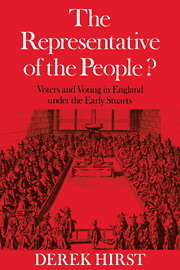7 - The electorate and politics
Published online by Cambridge University Press: 15 December 2009
Summary
The political impact of the wider franchises
Contemporary commentators, especially in the war years, were firm in the belief that the meaner sort were hostile to the Court. Hobbes's statement in Behemoth, cited in Chapter 4 above, that the freeholders and tradesmen inevitably elected men who were likely to vote against subsidies, is the clearest instance of this, though some of the more subtle observers would have qualified it with the rider that the real and apolitical poor were only swayed by the appeal of ‘beefe, bacon and bag pudding’. In general, though, an increase in the size of the electorate should have been calculated to increase the potential support for the national opposition, and to increase the frequency with which national political issues featured at the hustings. This might have been especially the case if, as we have seen, voters lower down the social scale were less secure in their allegiances, for the corollary of that could have been that they were more vulnerable to immediate and excited appeals to their political prejudices.
Where this hypothesis is most open to investigation, in an examination of what happened electorally to those boroughs which suddenly found their franchises expanded, it proves to be of only limited validity. For the local ingredient in urban politics, the tendency of insurgent groups to react against whatever the corporation might be doing, disrupts any facile equation. Even the assumption that the possibility of controlling the voters would be minimised by increasing their numbers sometimes did not hold good in face of local conditions.
- Type
- Chapter
- Information
- The Representative of the People?Voters and Voting in England under the Early Stuarts, pp. 132 - 154Publisher: Cambridge University PressPrint publication year: 1975
- 2
- Cited by



